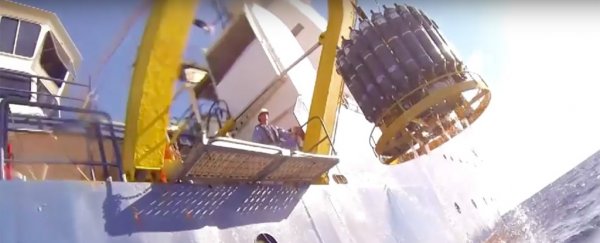A new means of studying sea organisms that doesn't entail bringing them back to dry land could set a new standard for scientific studies of marine environments.
The "lab-in-a-box" research project led by oceanographer Martina Doblin from the University of Technology, Sydney (UTS) Science in Australia gives researchers unrivalled access to the sea and the micro-organisms that live in it.
"Until now, we've been forced to bring samples back to our land-based laboratories, and to do that effectively we've had to preserve them," said Doblin. "With the new lab we have a chance to examine the activity of living cells and manipulate them in particular ways, to understand what their resilience is to ocean changes … we're able to characterise their activity much better. As a consequence it will give us a better understanding of their role in the ocean."
Doblin and her team trialled the mobile laboratory last June on board Investigator, an AU$120 million research vessel. The mini lab, known as Micro-CSI, is effectively a custom-fitted shipping container specially designed for marine studies and is jointly funded by a number of research organisations.
"The selling point for all the partner universities is having a platform to do specialised research on the microscopic planktonic organisms that help regulate Earth's biosphere," said Doblin, who serves as lead investigator and chair of the Micro-CSI steering committee. "It's of great interest to us as researchers but it also has relevance to the wider public because these organisms affect the way the oceans take up carbon dioxide."
With climate change and warming oceans transforming the natural environment of marine lifeforms, Doblin says it's essential to find out how sea creatures are adapting to the new circumstances caused by human activity – a task now made easier by the new sea-faring lab.
"Unless we really understand what those microbes are doing, we have no way of telling how their ecosystem functions will be affected if we change the environment," said Doblin. "We need to be able to quantify what these microbes can do under normal conditions and then, for example, if there's an oil spill, how much that function might diminish."
The oceanographer's research has been featured in a new book celebrating Investigator's predecessor, RV Southern Surveyor (research vessel), which for a decade carried Australian scientists including Doblin on more than 100 research voyages.
"Almost as soon as we sailed east of Sydney, there was a change in water temperature which coincided with a change in the microbial community, which absorbed carbon dioxide at a lower rate," said Doblin. "It's important to understand how these organisms respond to increases in carbon dioxide and temperature because this will give us an indication of the future state of Australia's oceans."

UTS Science is a sponsor of ScienceAlert. Find out more about their research.
